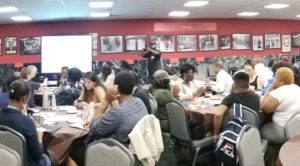Equity and Energy Workshop shows a path forward for an inclusive energy system


Washington, D.C. is one of three cities—along with Atlanta and Seattle—chosen to be a part of the 100% Clean Cities Initiative. The initiative is designed to ensure that the cities create a model to promote an equitable transition into 100% renewable energy that ensures no one is left behind in the efforts. In D.C., Solar United Neighbors of D.C. is partnering with Empower DC, the District’s Department of Energy and Environment, and DC Fiscal Policy Institute to lead the effort.
As part of this work, the 100% partnership hosted two workshops where District residents came together to discuss energy and equity issues. The workshops took place over two days this fall: Saturday, September 22 and Saturday, October 6. Organizers worked hard to recruit a socially and economically diverse group of participants, and were rewarded by the participation of 55 Washingtonians from across the city.
The first workshop in September focused mostly on defining equity and offered an introduction to renewable energy, as many participants were new to the topic. The participants heard from Georgetown University Professor Maurice Jackson, who discussed the “historical roots of racial inequality and what we must do to fix it now.” Participants reflected on how their lives would be different if racial equity is achieved. Community Organizer Tiffany Aziz spoke about her community’s opposition to the Mt. Vernon substation proposed by Pepco and reflected on the role that racial inequity plays in energy production and distribution decisions. Participants were then given the opportunity to write letters to the Public Service Commission opposing the Mt. Vernon Substation. The workshop wrapped up with a high-level introduction to solar energy.
For the second workshop in October, we discussed racial inequity in the District. Kate Coventry from DC Fiscal Policy Institute explained what the demographics tell us about racial inequity in D.C. and the factors we need to consider when addressing racial equity in the transition to 100% renewable energy. Participants had an opportunity to discuss their ideas on how to build a citywide conversation about racial equity and what that community engagement would look like. The District’s Office of Sustainability presented on how our city is addressing racial equity with both the Clean Energy DC Plan and the Sustainable DC Plan. To end the day, participants learned more about the District’s current renewable energy policies, including an overview of the Clean Energy DC Omnibus Amendment Act of 2018 and the Distributed Energy Resource Authority Act.
After two days of intensive workshops, participants were able to take home a clearer understanding of renewable energy policies and how these policies impact racial inequity. Furthermore, the participants were given the tools to start a grassroots movement to address racial inequity through the renewable energy transition. This last point is critical, especially since the District is working towards the transition to 100% renewable energy. It is crucial that our community has the tools to contribute to this discussion. Community members must be able to dictate how this transition takes place and ensure that it is an equitable one.
